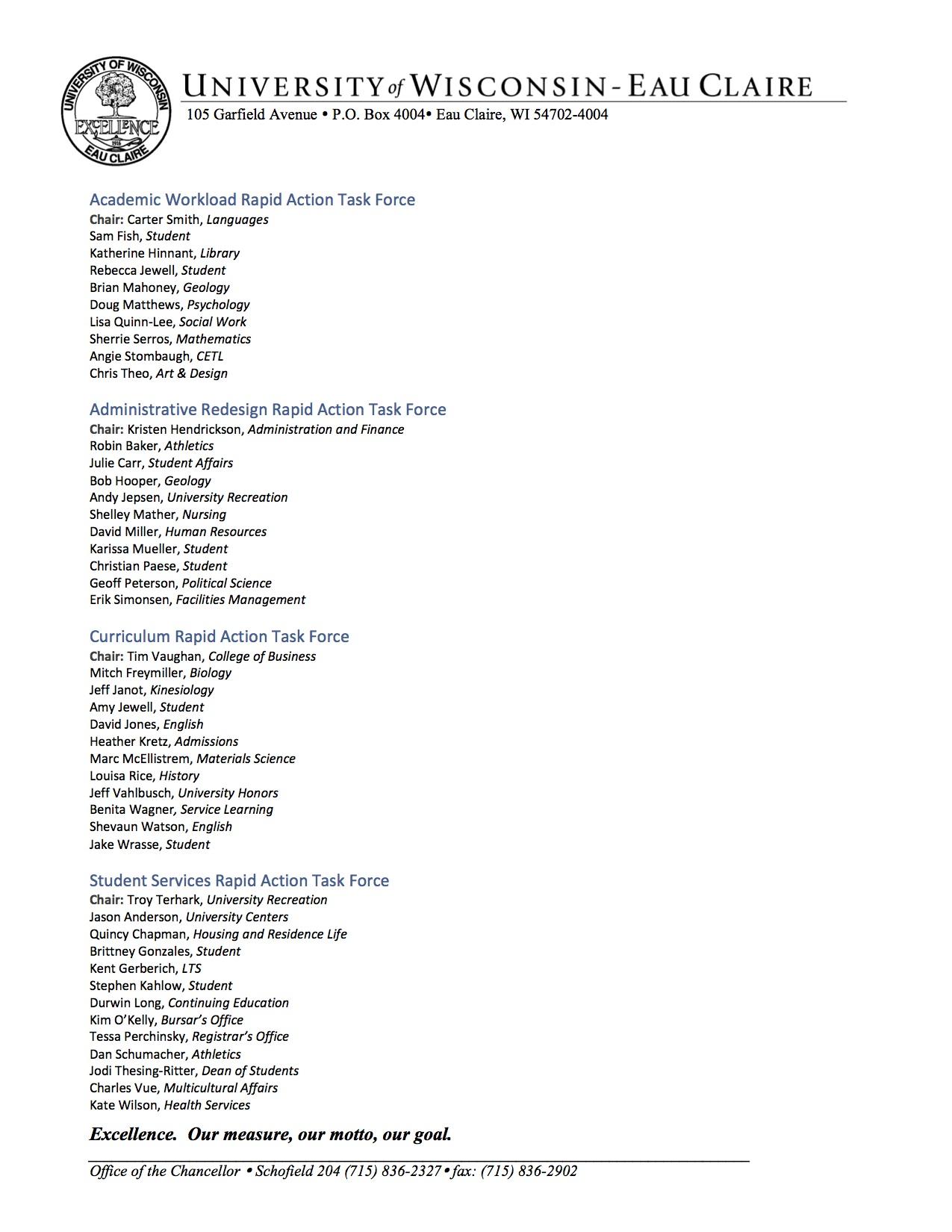‘Rapid action’ meetings public, but meetings and papers off-limits
Task forces seek light at the end of state budget
Photo by FILE PHOTO
March 4, 2015
UW-Eau Claire officials contend “rapid action task forces” trusted to shape the university’s future must meet in public — while minutes and related papers will remain sealed.
Chancellor James C. Schmidt formed four task forces to draft cost-saving plans ahead of a proposed $300 million cut to the UW System.
Teresa O’Halloran, Eau Claire affirmative action officer and public records custodian, said Wisconsin Open Meetings law requires Eau Claire to open task force meetings to the public, but minutes and relevant documents from those meetings won’t be available.
O’Halloran said she plans to find a second legal opinion before posting more than meeting schedules. Officials will post meeting dates on Eau Claire’s website.
“It may be worth posting minutes out of convenience,” she said, “since it’s already at point of people filing open records requests.”
The Spectator has filed multiple open record requests for documents and minutes from task force meetings. Those requests are currently pending.
O’Halloran said officials won’t record task force meetings; there’s potential for “tension” in those meetings and recordings would make that tension worse.
“Stuff gets thrown around,” O’Halloran said. “(Task force members) would not want word getting back to (a faculty or staff member) if their program were to face cuts.”
Eau Claire plans to cut about 27.3 Full Time Equivalent faculty and staff positions next year to even UW-Eau Claire’s existing $4.5 million deficit by about $2.8 million.
The university will likely need to trim about $9 million more from its budget next year, to meet cuts inside Gov. Scott Walker’s 2015-17 state budget proposal. About 85 percent of the university’s budget funds faculty and staff.
TASK FORCE ASSIGNMENTS
Schmidt’s final assignments for task force members — made available to all faculty, staff and “student leaders” through an email Feb. 16 — whittled 140 nominations to 46.
Schmidt amended an initial list of task force members that didn’t reflect “Equity, Diversity, and Inclusivity values,” according to the email.
“It became obvious that with good intent, but too much haste, we had complied groups that included no people of color and too few classified staff and women,” Schmidt wrote then.
Task forces will downsize all aspects of the university — student services, course offerings, employees and “red tape,” Schmidt said in an interview Feb. 17. Decisions will reflect university priorities.
“Across-the-board-cuts are for lazy administrators, what that does is weaken everything,” Schmidt said. “I’m going to respect the work of the task forces, I’m going to respect the work of the administrative chairs.”
MJ Brukhardt, Special Assistant to the Chancellor, said task force members will find ways to balance efficiency with future university goals.
“We need to be proactive,” Brukhardt said, “because we know (the cut) will be significant.”
The task forces will review four areas of campus life:
— Student services
— Administration
— Curriculum
— Academic workload
MEETINGS UNDERWAY
Troy Terhark, chair of the student services task force, said students must hike across campus to solve problems — Eau Claire doesn’t offer many services in a single office. His task force must find ways to streamline those processes to save money.
Terhark said the committee is halfway done after its meeting Tuesday ahead of a March 20 deadline, where he and other members of each task force will present their finalized drafts of service changes to the Chancellor.
But Terhark said he doesn’t know what will be prioritized once his group meets with the rest of the task forces.

“It’s hard to tell,” Terhark said. “We’ve got to figure out funding, feasibility, how much can you do and absorb at one time.”
Jake Wrasse, student body vice president and student member of the curriculum task force, said task forces, and their “all-star” members — 8 student senators and 38 faculty members — are updated on Eau Claire’s budget situation.
Wrasse said members will spend about five hours a week in meetings on top of individual research at home.
With limited time to act, Wrasse said it’s important the task force can “move through the process” of addressing the budget.
“Our intention is to allow students to know if they have questions, they can come to us,” Wrasse said. “That’s where student opinion is so important.”

